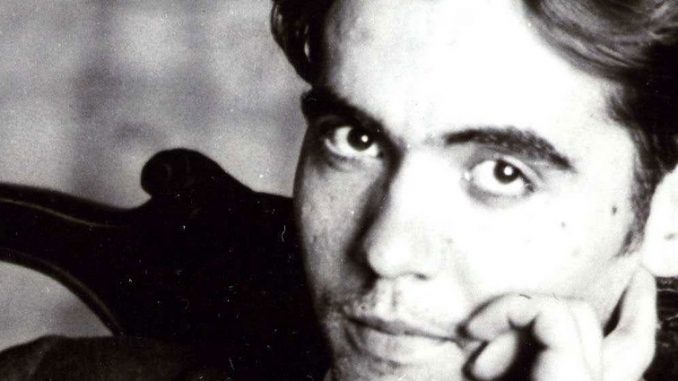
By Ingrid Fernández
84 years since the murder of the great Federico García Lorca: poet, playwright, musician, cartoonist and theater director.
García Lorca was shot at dawn on August 18, 1936. It is one of the few certainties surrounding his death. The rest is covered in a mystery that, to this day, has not been revealed.
In July 1936, Federico saw his existence threatened in Madrid due to the advance of an absolutely intolerant and violent right agasint the Republican Government. He decided to return to his native Granada, to say goodbye to his family. He had the plan of traveling to Mexico, where his friend, the actress Margarita Xirgu, would perform “Yerma” and “Bodas de sangre”, two of his most famous plays.
Criticism of the poet had increased. Though he detested party politics (for this reason he never became a member of the Communist Party), he became an uncomfortable character for the rancid Madrid right for his statements against social injustices, such as “The world has stopped in the face of the hunger that devastates the peoples” or “Never will men imagine the joy that will explode on the day of the Great Revolution”. He was also persecuted because of his friendship with declared socialists like Margarita Xirgu or Republican Minister of Education Fernando de los Ríos Uruti, as well as for his homosexuality.
He arrived in Granada on July 14, three days before the military coup against the Republic, which would start the Civil War, broke out in Melilla. By the 20th, Granada was already in hands of the Falange and his brother-in-law, mayor of the city, was arrested and shot a month later. As it was no longer safe to stay in his family´s home, he decided to hide in the house of his friend Luis Rosales, a Falangist poet, which is why he believed that his presence there would go unnoticed.
Who gave him up? Many hypotheses, none proven
On August 16, he was arrested by the Civil Guard. According to his biographer Ian Gibson “it was a major operation.” The Civil Guard surrounded the block where the house was located and there were even armed guards on the adjoining roofs to prevent him from escaping through there. At the head of the operation was Ramón Ruiz Alonso, a former deputy of the CEDA (Spanish Confederation of Autonomous Rights), an extreme right-wing Catholic, who hated the poetprofoundly. According to the (now lost) report signed by Ruiz Alonso, he was charged with “being a spy for the Russians, being in contact with them through radio, having been the secretary of Fernando de los Ríos Urruti and being homosexual.”
The Rosales and musician Manuel de Falla moved heaven and earth to attain his freedom, but nothing was to be done.
Two days later they “gave him a ride” (euphemism used for the procedure of shooting detainees in a field). Exactly what happened there is unknown. It is presumed that he was taken by car along the road that connects the towns of Viznar and Alfacar, perhaps with one or more detainees, and that at some point they were made to get out and walk through a forest until they reached an open ditch. There, Federico apparently shouted an insult at his jailers, which caused one of them to slap him on the head. He fell into the ditch dragging his co-conscript down with him, as they were tied together. There, shouting “red fagot” their jailers shoot them several times and then spit on them.
His body was never found. He is still buried in one of the 3,000 documented mass graves, along with another 140,000 people that were disappeared by the Franco regime, who are waiting to be exhumed, receive justice and historical reparation for their families.
Federico García Lorca was 38 years old and he left us 9 books of poetry, one of prose and 12 unforgettable plays, many of which I had the honor of seeing at the San Martín Theater.
“Poetry does not want followers, it wants lovers.”
Reading it is a commitment to beauty, justice and socialism.








